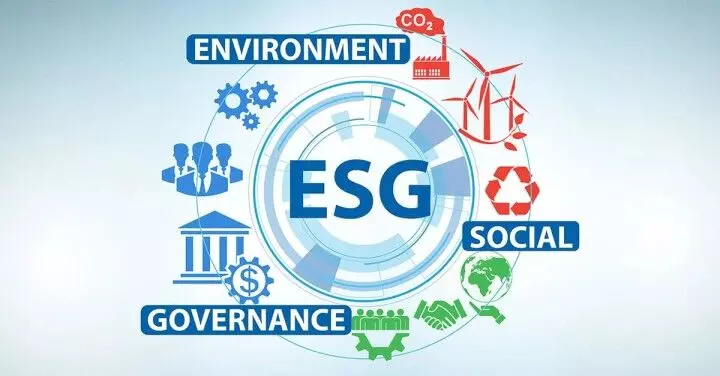How Indian Brands Are Driving the Net-Zero Mission on International ESG Day

How Indian Brands Are Driving the Net-Zero Mission on International ESG Day
Indian companies are at the front, embracing renewable energy solutions, clean technologies, and the principles of a circular economy.
As the world embraces Environmental, Social, and Governance (ESG) principles to tackle urgent climate challenges, India stands at the crossroads of its sustainability journey. With a promise to reach net-zero emissions by 2070, the nation has set an ambitious but achievable goal that inspires businesses from all sectors to harmonize their strategies with this vision. On International ESG Day, it is the growing importance of Indian brands in enabling the low-carbon economy that gets center stage.
Indian companies are at the front, embracing renewable energy solutions, clean technologies, and the principles of a circular economy. Such initiatives are social inclusivity and are beginning to show that sustainability not only has an ecological purpose but also an economic bottom line. As 2025 approaches, these united forces are demonstrating the transformative power that ESG integration can yield in shaping a greener, more resilient India.
Prabir Chetia, Head - Growth Advisory and Procurement at Aranca, shared the company’s dedication to sustainability, detailing initiatives that aim to minimize environmental impact. “Aranca is deeply committed to sustainability and has implemented a range of initiatives to reduce its environmental footprint. The company has transitioned to a paperless environment, minimizing waste and significantly reducing plastic usage by prioritizing recycled materials. A key achievement is the installation of a water recycling system, which helps conserve water and promotes sustainable practices. Additionally, Aranca has focused on energy efficiency by adopting energy-efficient resources and installing sensors to minimize power consumption. Employees play a vital role in this initiative, being highly conscious of resource usage, ensuring that wastage of resources is minimized across operations.”
He further added, “Many employees have even embraced electric vehicles, further demonstrating their dedication to a greener, cleaner environment. These actions reflect Aranca’s ongoing commitment to sustainability, aiming not only to reduce its ecological impact but also to inspire others to adopt more environmentally responsible practices.”
Another notable example is Ghodawat Consumer Ltd, which has made significant progress in renewable energy adoption. Thippeswamy Papareddy, Associate Vice President QMS and Sustainability at Ghodawat Consumer Ltd, remarked, “On International ESG Day, it's essential to recognize how businesses in India are not just contributing to global sustainability goals but are actively shaping the nation's path to a net-zero future. By embracing renewable energy, adopting circular economy principles, and innovating sustainable solutions, brands are not only aligning with India's climate goals but are also setting new standards for corporate social responsibility.
“At Ghodawat Consumer Ltd, we are on the course of transformation. We achieved a 42% increase in renewable energy share in total consumption for FY 2023-24. Our aim is to increase 75% renewable energy usage in each manufacturing unit by 2026 and to become carbon-neutral by 2030.”
Nehal Gupta, Founder and MD, Accelerated Money For U (AMU), stated, Electric vehicles (EVs) play a crucial role in India's journey toward achieving its net-zero goal. EV financing is emerging as a significant driver of adoption. By guaranteeing affordability, accessibility, and long-term effects, sustainable investment in EVs and related infrastructure is transforming the transportation industry.
Financing EV purchases is only one aspect of sustainable investing; other aspects include integration with renewable energy sources, charging infrastructure, and retrofitting solutions. This creates a strong environment that encourages widespread EV adoption, including in rural and semi-urban areas.
Additionally, these investments align with global ESG goals, which include investments that strive to promote social inclusion, environmental sustainability, and good governance. Because they link their portfolios with the sustainability goal and concentrate more on green projects, these financial institutions are crucial to this transition.
As India progresses toward its net-zero goals, EV financing and sustainable investment are proving indispensable in building a cleaner, more resilient transportation landscape and driving systemic change for the future.
The contributions of Indian businesses like Aranca, Ghodawat Consumer Ltd and Accelerated Money For U exemplify the vital role that private enterprises play in furthering the nation's climate objectives. Their initiatives not only assist in mitigating climate change but also transform industries through sustainable innovations.
International ESG Day serves as a timely reminder that achieving net-zero emissions is a shared responsibility. With companies taking up EV financing, green infrastructure development, and systemic sustainability investment, the roadmap to achieve net-zero in India is gradually becoming more evident. In doing so, all these efforts indicate the country's commitment to sustainability and its emergence as a global leader in ESG. As brands continue to innovate and set a compelling example, they show that sustainability is beyond strategy; it is an essence of the future.

















